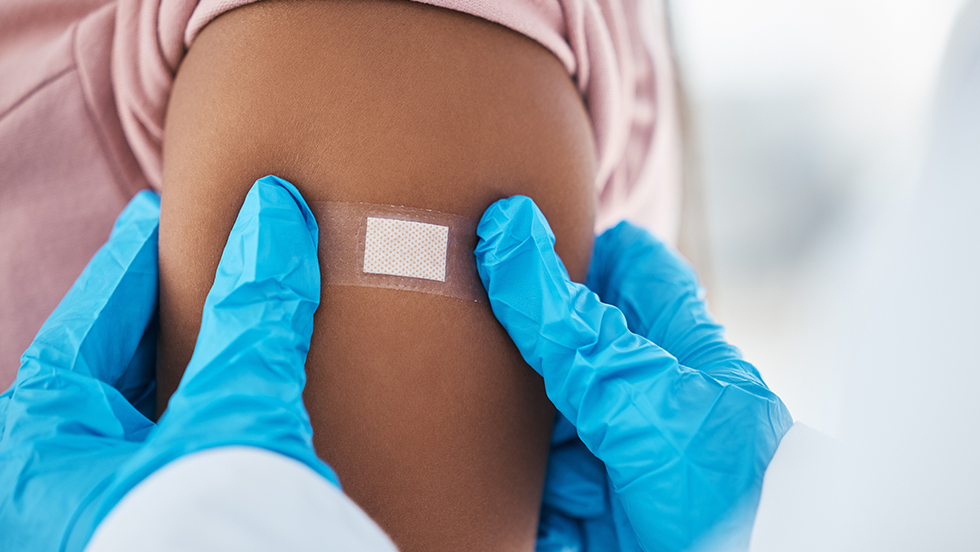
With vaccines dominating the news, and misinformation spreading rapidly, an Adelphi professor specializing in public health and disease prevention launched a study. The goal: to get to the heart of why parents choose—or refuse—to vaccinate their children.
In 2021, Korede Yusuf, PhD, associate professor in the College of Nursing and Public Health, read an exciting headline: Nigeria was going to introduce the HPV vaccine into its routine immunization schedule for girls ages 9 to 14.
As an expert in maternal and child health inequalities, and a Nigerian native herself, Dr. Yusuf saw a research question in the making—and the chance to make a difference. “I wanted to understand how much Nigerian parents really knew about HPV, about the cancers it causes, about the vaccine itself and if they intended to get it,” she said. “By gathering that information in advance, we could identify reasons for potential HPV vaccine hesitancy and understand how to convince parents to immunize their children when the vaccine became available.”
Addressing a History of Vaccine Skepticism
In Nigeria, cervical cancer is the second most common cancer among women. Yet the nation’s immunization rates have historically been extremely low, in part due to mistrust of Western medical intervention. So while the HPV vaccine offers close to total lifelong protection against cervical cancer, Dr. Yusuf wasn’t certain Nigerian parents would see the vaccine as a silver bullet for their children. But to change parents’ minds, Dr. Yusuf knew she would first have to identify what was holding them back.
Dr. Yusuf and her team interviewed more than 1,000 parents and caregivers across Kano State, the most populous state in Nigeria. Participants were asked several questions, including if they had ever heard of HPV, the main reason they would not want to vaccinate their child(ren), and whether they would pursue the vaccine if it were available for free or more cheaply. At the time of Dr. Yusuf’s study, the HPV vaccine was only available for a substantial fee from private hospitals.
Discovering the Drivers of Parental Hesitancy
The interviews returned some unexpected results. Given the history of vaccine skepticism in Kano, Dr. Yusuf said she “predicted very low intention rates going in.” But about 67 percent of parents indicated a willingness to vaccinate their children if the vaccine were free or subsidized. Dr. Yusuf also found that parents in urban areas were more likely to be hesitant, which came as a surprise. “I assumed people in rural areas would have less access to news and educational materials, so they would be less aware of the vaccine,” she explained, “but it might actually have been because they have minimal access to social media and therefore less misinformation.” Fathers showed higher rates of hesitancy than mothers, which “should worry us. Nigeria is a patriarchal society, so fathers are the ones making key decisions for the family.”
In addition to “high-risk groups,” the study conclusively identified the most common reasons for vaccine hesitancy. In general, hesitant parents were (1) concerned about the vaccine’s safety, (2) did not believe their child(ren) needed it, (3) had not received a recommendation from their doctor, or (4) were not aware of the vaccine itself. In fact, only about 4 percent of participants had ever heard of HPV.
Dr. Yusuf is no stranger to the complicated factors that shape a population’s relationship with vaccination. Having previously studied immunization coverage gaps in the United States, she sees a clear difference between vaccine-hesitant American and Nigerian parents. “The biggest problem in the U.S. is probably misinformation or disinformation from social media. But in Kano, few people have access to social media.” Why, then, do rumors and myths about vaccines still run rampant, even for urban residents? “Many Nigerian communities believe what their religious and cultural leaders say. And sometimes those leaders say things that are misleading or inaccurate.”
Using the Right Tools to Champion Vaccination
Now that Nigeria’s HPV rollout is underway, public health officials can target these variables—whether in isolation or together—when developing vaccination campaigns. As Dr. Yusuf noted in her subsequent report, “HPV vaccine hesitancy among parents and caregivers of adolescents in Northern Nigeria” (Vaccine: X, December 2024), “tailoring interventions to address the unique compositions and concerns of these communities is essential for improving vaccine uptake.”
In particular, public health programs in Kano must address knowledge-related barriers when designing and implementing interventions. “We need to partner with trusted figures in the community to make sure people are getting accurate information,” Dr. Yusuf said. “We need to focus on educating, creating awareness, and stressing the link between vaccines and cancer prevention.”
Dr. Yusuf is currently completing an article from the study’s qualitative component, which will provide in-depth information on how to increase HPV vaccine uptake and actionable strategies for vaccine managers and policymakers in Kano. While she admits we still have much more to learn about the vaccine’s uptake in northern Nigeria, her work is steadily helping close the immunization gap, one study at a time.